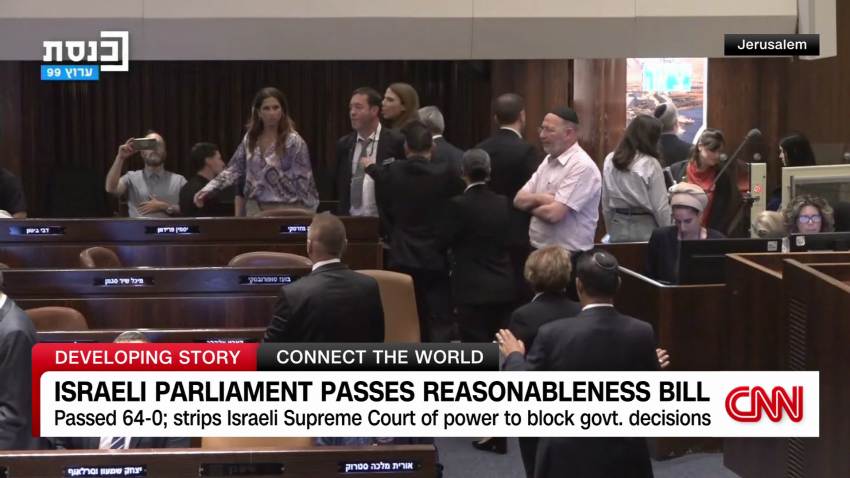Editor’s note: Frida Ghitis, a former CNN producer and correspondent, is a world affairs columnist. She is a weekly opinion contributor to CNN, a contributing columnist to The Washington Post and a columnist for World Politics Review. The views expressed in this commentary are her own. View more opinion on CNN.
There is no question that history books will dedicate considerable space to the impact that Israeli Prime Minister Benjamin Netanyahu had on the fate of his embattled nation.

After all, Netanyahu, nicknamed “Bibi,” was already the longest-serving prime minister before he managed to secure another stint in the top job in December, launching his most tumultuous term in office and the one that may well end up defining his legacy.
And right now, that legacy looks like a dark one.
Unless there’s a sudden reversal, it is likely that history will remember Netanyahu as the man who served the interests of Israel’s enemies by tearing the country into bitterly opposed camps. Instead of seeking common ground and trying to bring the people together, he pushed ahead with a plan that undermined the country’s democratic foundations.
On Monday, as if history were trying to highlight the fragility of his power, Netanyahu was released from hospital after an emergency intervention to implant a pacemaker in time for a key vote in the Knesset, Israel’s parliament.
The opposition boycotted the vote, but the Knesset approved a key element of the proposed judicial overhaul aimed at curtailing the power of the courts and strengthening that of the parliament, the Cabinet and the prime minister – all under Netanyahu’s control. The bill, approved 64-0, abolishes the so-called reasonableness clause, weakening the Supreme Court’s ability to review Cabinet decisions it views as unreasonable.
It’s all part of a legislative package that Netanyahu’s supporters call “reforms,” arguing they would strengthen democracy. However, opponents insist these measures constitute a coup, allowing Israel’s most right-wing government in history to govern without any checks and balances and potentially inching the country toward dictatorship.
In the United States, the three branches of government can restrain one another, and the 50 states operate with a great deal of autonomy. But in Israel’s parliamentary system, the prime minister controls not just the executive but also the legislature through his majority coalition in parliament. And there are no separate state courts and legislatures. Without judiciary oversight, the prime minister and his bloc have little to stop them as they push their agenda.
Supporters of the overhaul say it reflects the results of elections and would make the country more democratic by defanging unelected judges.
But the move has raised alarms across the country. For 29 consecutive weeks, Israelis have been protesting in the streets, blocking highways and demanding a stop to far-reaching changes to their country’s legal system. The demonstrations have been enormous, bringing out as many as 200,000 people at a time by some estimates, in a country of just 10 million.
The passion driving these defenders of democracy is the one bright side to Israel’s crisis. This past weekend, thousands undertook a grueling march from Tel Aviv to Jerusalem, a steep uphill climb in scorching temperatures. They have been determined to stop what they say will change the character of their country.
In an “emergency letter” published in January, prominent economists warned that “the concentration of vast political power in the hands of the ruling group without strong checks and balances could cripple the country’s economy.”
Top security officials wrote a scathing letter to Netanyahu, holding him personally responsible for causing serious harm to Israel’s security. Reservists have said they will stop volunteering, and scores of businesses are closing their doors in protest.
Netanyahu’s agenda is very different from what he promised when he came to office again seven months ago. Back then, he vowed to focus on stopping Iran’s nuclear program, expanding Israel’s relations with Arab countries and strengthening the economy.
But Netanyahu shifted gears almost immediately, and he did it most likely to secure his hold on power by pleasing his new far-right coalition partners and possibly — although he sternly denies it — to protect himself from the ongoing corruption prosecutions he faces, on charges he denies.
For Netanyahu, it’s a fight for his survival. For Israel, it is a battle over the character of the country. Will it remain a modern, pluralist democracy — a Jewish-majority nation with a secular government — or will it become a nationalist religious country with laws that reflect religious tenets, with less respect for pluralism and individual rights and perhaps more authoritarianism.
To become prime minister, Netanyahu had to enlist the support of enough parties to have 61 votes out of the 120 seats in the Knesset. He cobbled together a coalition by bringing in right-wing extremists who until then had been viewed as pariahs.
Far-right activists Itamar Ben Gvir and Bezalel Smotrich, whose parties combined won 13 seats out of 120, now hold power to enact their extremist positions, including expanding Israel’s control of the West Bank, reversing socially liberal policies and injecting more religion into public life.
Netanyahu had long tempered his ideology with pragmatism, but changing course could mean losing their support and seeing his coalition collapse.
Polls show that Netanyahu’s popularity started sinking from the moment he started pushing the far right’s agenda. A February poll found roughly two-thirds of Israelis opposing the overhaul. Since then, multiple surveys have showed that if elections were held now, Netanyahu and his right wing would lose power.
Most dramatically, a poll released during the spring Passover holiday found Netanyahu’s approval collapsing. When asked whom they would prefer as prime minister, just 34% said Netanyahu over the center-right Benny Gantz, with opposition leader Yair Lapid also beating the Israeli leader.
President Joe Biden, whom Israelis know as a supporter of Israel, has been urging Netanyahu to safeguard Israeli democracy and try to build across-the-board support for changes. Florida Gov. Ron DeSantis, a 2024 GOP presidential candidate, has said Biden should butt out of Israel’s internal deliberations. Others say it’s time for the US to start pulling away from Israel. Biden is right in staking out a middle path. Israelis care what its indispensable ally thinks.
Get our free weekly newsletter
Netanyahu has been the towering figure in Israeli politics for decades. He is a brilliant man and a gifted politician. He has notched major achievements that have benefited Israel. He unleashed the country’s economic dynamism, helping turn it into a financial, technology and security powerhouse. He built Israel’s diplomatic ties in a hostile environment, even among Arab countries.
But he also choked the last breath out of an admittedly moribund two-state solution without offering a meaningful path out of the conflict with Palestinians, and he undermined bipartisan support for Israel in the US by contributing to former President Donald Trump’s politicization of the issue.
Now, for his own benefit, Netanyahu is toying not only with Israel’s democracy but also with its social fabric, with the cohesion it needs to survive when so many still vow to destroy it. Unless he changes course, history will not be kind.

